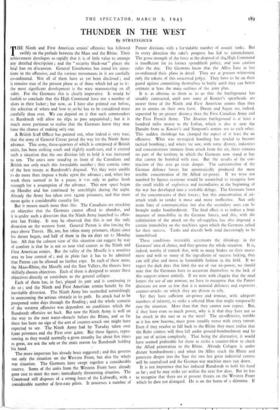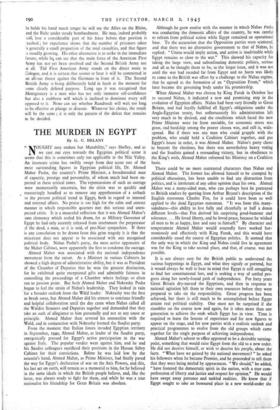THUNDER IN THE WEST
By STRATEGICUS
r HE Ninth and First American armies' offensive has followed 1 swiftly on the prelude between the Maas and the Rhine. Their achievement developes so rapidly that it is of little value to attempt any detailed description ; and the "security black-out" places the final ban on discussion. General Eisenhower has stated his inten- tions in the offensive; and the various movements in it are carefully co-ordinated. Not all of them have as yet been disclosed ; and it remains true of the present phase as of those which led up to it: the most significant development is the wary manoeuvring on all sides., For the Germans this is clearly imperative. It would be foolish to conclude that the High Command have not a number of shots in their locker ; but now, as I have also pointed out before, the selection of where and how to strikes has to be considered more carefully than ever. We can depend on it that such commanders as Rundstedt will allow no slips to pass unpunished ; but it is much more pertinent to realise that the Germans know they may have-the chance of making only one.
A British Staff Officer has pointed out, what indeed is very true, that the army of General Crerar paved the way for the Ninth Army advance. This army, three-quarters of which is composed of British units, has been striking south and slightly south-east, and it created such a situation that the one division left to hold it was increased to ten. The units now standing in front of the Canadians and British not only reach this formidable number ; they contain some of the best troops at Rundstedt's disposal. Yet they were unable to do more than impose a brake upon the advance ; and, when last week there Seemed to be a pause, it was only to gather fresh strength for a resumption of the advance. This new spurt began on Monday and has continued by searchlight during the night. Already the Army has taken over 14,000 prisoners, and that must mean quite a considerable casualty list.
But it means much more than this. The Canadians are attacking an objective that the Germans cannot afford to abandon, and it is under such a diversion that the Ninth Army launched its offen- sive last Friday. It may be observed that this is not the only diversion on the western front. General Patton is also forcing the pace above Treves. He, too, has taken many prisoners, 18,000 since his thrust began, and half of them in the six days up to Monday last. All that the calmest view of this situation can suggest by way of comfort is that he is not so near vital centres as the Ninth and First American armies. But the valley of the Moselle is a sensitive area to lose control of ; and in plain fact it has to be admitted that Patton can be allowed no further rope. In each of these areas, the Maas-Rhine, the Moselle and the Saar Valleys, the thrusts have skilfully chosen objectives. Each of them is designed to secure these objectives-directly or contribute to the general collapse. Each of them has, in fact, played its part and is continuing to do so ; and the Ninth and First American armies benefit by the inevitable diversion. The Ninth Army has succeeded astonishingly in overcoming the serious obstacle in its path. Its attack had to be postponed some dais through the flooding ; and the whole scenario of the western offensive was dependent on conditions which the Rundstedt offerisive set back. But now the Ninth Army is well on the way to the next water-obstacle before the Rhine, and so far there has been no sign of the sort of counter-attack one might have expected to see. The Ninth Army had by Tuesday taken over 6,000 prisoners and the First over 4,000. But these figures, repre- senting as they would normally a gross casualty list about five times as great, are not the sole or the main reason for Rundstedt holding his hand.
The more important has 'already been suggested ; and this governs not only the situation on the Western Front, but also the whole war situation. The Germans have swept together a considerable reserve. Some of the units from the Western Front have already gone east to meet the more immediately threatening situation. The Command still disposes of a strong force of the Luftwaffe, with a considerable number of first-rate pilots. It possesses a number of
Panzer divisions with a formidable number of assault tanks. But in every direction the rake's progress has led to retrenchment.
The gross strength of the force at the disposal of the.High Command is insufficient for its former spendthrift policy, and now caution rules the day. The Germans know that the Allies riave at last co-ordinated their plans in detail. They are at present witnessing only the tokens of this concerted policy. They have to be on their guard against committing themselves to battle until they can better estimate at least the main outlines of the joint plan.
It is as obvious to them as to us that the battleground has steadily contracted, until now some of Koniev's spearheads are nearer those of the Ninth and First American armies than they are to armies on their own front. Duren and Sagan are, indeed, separated by no greater distance than the First Canadian Army and the First French Army. The Alsatian battleground is at least a hundred miles nearer to the Italian, which is also as near the Danube front as Koniev's and Simpson's armies are to each other.
This sudden shrinkage has changed the aspect of at least the air offensive. What was suntegical bombing has tended to become tactical bombing ; and where we saw, with some dismay, industries and concentrations immune from attack from the air, there remains no part of the territory in which the Germans now stand at bay that cannot be bombed with ease. But the results of the con- traction of this area go even deeper. The concentration of the German defence forces has automatically produced the most terrible concentration of the Allied air-power. If we were not numbed by figures everyone would be astonished to recognise how the small trickle of explosives and incendiaries at the beginning of the war has developed into a veritable deluge. The Germans boast of the concentration of their forces ; but this concentration of air- attack tends to render it more and more ineffective. Not only main lines of communication but also the secondary ones can be brought under bombardment. The final effect is to induce a large measure of immobility in the German forces, and this, with the culmination of the attack on the oil-supplies, has also imposed a certain immobility on the machines upon which the Germans relied for their success. Tanks and aircraft both tend increasingly to be immobilised.
These conditions inevitably accentuate the shrinkage in the Germans' area of choice, and they -govern the whole situation. It is, indeed, worthy of remark that, with so many brakes on their move- ment and with so many of the ingredients of success lacking, they can still plan and move in formidable fashion in the field. If we regret the dark days that limit the use of our air-power, we should note that the Germans have to accustom themselves to the lack of this support almost entirely. If we note with chagrin that the mud fetters the use of our armour, we have to recognise that the Panzer divisions are now so few that it is material defences and expensive counter-attacks on which they are driven to rely.
Yet they have sufficient air-power and armour, with adequate numbers of infantry, to strike a selected blow that might temporarily ease the situation. More than that they cannot now expect. But, if they have even so much power, why is it that they have not so far struck in the east or in the west? The air-offensive, terrible as it has now become, must grow steadily worse with every retreat. Even if they resolve to fall back to the Rhine they must realise that the Ruhr centres will then fall under ground-bombardment and be put out of action completely. That being the alternative, it would have seemed preferable for them to strike a counter-blow to check the Allied penetration to the Rhine. Already Cologne is under distant bombardment ; and when the Allies reach the Rhine and penetrate deeper into the Saar the two last great industrial centres will be neutralised and the German war machine must run down.
It is not impotence that has induced Rundstedt to hold his hand so far ; and he may strike yet within the next few days. But he has to recognise that there are at present threats on the Western Front which he dare not disregard. He is on the horns of a dilemma. If he holds his hand much longer he will see the Allies on the Rhine, and the Ruhr under steady bombardment. He may, indeed probably will, lose a considerable part of his force before that position is :cached; for experience shows that the number of prisoners taken is generally a small proportion of the total casualties, and that figure is steadily growing. His other alternative is to strike in the immediate future, while hs can see that the main force of the American First krmy has not yet been involved and the Second British Army not at all. Tha First American Army stands on the direct route to Cologne, and it is certain that sooner or later it will be committed in . an all-out thrust against the Germans in front of it. The Second British Army is being deliberately held in leash at the moment for some clearly defined purpose. Long ago it was recognised that Montgomery is a man who has not only immense self-confidence but also a stubborn will which is inclined to dominate every will opposed to it. None can say whether Rundstedt will wait, too long to be effective or plunge to disaster. Whatever his choice, the result will be the same ; it is only the pattern of the defeat that remains to be decided.



























 Previous page
Previous page